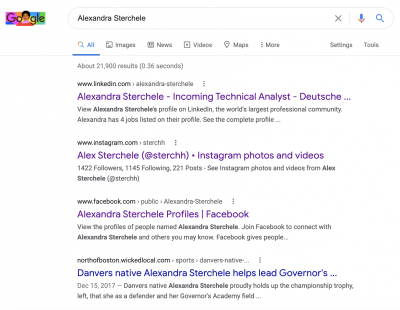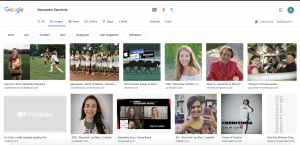Alexandra Sterchele
When I was tasked with searching my identity on the internet, I was reluctant at first and it made me anxious about what I would find about myself and not being able to do anything about it. According to howmanyofme.com, I am the only Alexandra Sterchele in the United States. I couldn’t rely on another Alexandra Sterchele living 1000 miles away, for example, to justify embarrassing or undesirable search results. I consider my privacy extremely important and I make it a point to not overshare on my social media accounts or online. As I underwent these searches I was pleasantly surprised to see the internet had not descended below the surface of my iceberg.
Contents
How Well Does Google Know Me?
Typing into Google “Alexandra Sterchele” and hitting the search button, about 7 relevant pages to my search appeared. Most links were newspaper articles and accolades I received in high school for grades, sports, and my ceramics work. A couple were related to Michigan’s SHEI Magazine since I’m on their editorial board and run the website. The first few options that came up were my LinkedIn, Instagram, and Facebook accounts. When I clicked on the links to my accounts, I made sure I was logged out to get an outside perspective of how my accounts were viewed.
Social Media
Entering my LinkedIn profile, I was surprised to see all of my information as if I was logged onto my account. My activity, experience, education, volunteer experience, courses, organizations, and groups were on full display for anyone to see. I was almost positive I had made my account private, yet my search showed otherwise. I instantly went to my settings page and disabled all the public sections of my account except for my profile and background photo, header, education, and summary. I only found it necessary for those I was connected with to see this content, even though it was general information.
With my Facebook and Instagram accounts, not much information was able to be analyzed considering my accounts on these platforms were private. Both accounts only included my profile pictures along with followers/friends count and a bio if I included one. Only individuals I allowed to follow/friend on these platforms were able to see all the information relayed on my accounts. Before I accept a follower/friend request, I make sure I know who they are or how I may have a connection with them to prevent unnecessary people from seeing my posts.
Images
I switched over to the images side of Google and of about the 25 images, less than half were relevant to myself. The pictures applicable to myself included me playing field hockey along with my two New England championships, Medium articles I’ve written, SHEI Magazine features, and even a picture of my deceased Abuela linked to her obituary. Compared to a Google search under the “All” tab, the “Images” tab gave little insight into who I was or my presence online. Most of the images that were of myself were quite outdated and did not reflect how I look now as a 21-year-old college student.
Searching "Alex Sterchele"
While searching my identity, I also tried my nickname, Alex, instead of Alexandra. Throughout my life, I’ve identified and introduced myself as Alex, so I was interested to see if there was a difference in outcomes. Surprisingly, there were more page results (10 this time), however, at most 50% of these links were directly related to me while the rest contained information with both words “Alex” and “Sterchele” at separate times. Content such as high school field hockey game footage and YouTube videos I created for a project assignment in my Honors engineering class were available that weren’t in my formal name search. At one point in time, there was a professional soccer player with the last name “Sterchele” so a decent amount of these results were related to him, too.
Privacy Concerns
One of the page results was from LeadAbroad, a study abroad program, that used my picture on their website. I had applied to their intern program in the summer of 2020, yet never formally worked for them. How could they use my picture and name to recruit study abroad students? I reviewed their Information, Collection, Use, and Sharing Privacy Policy which states:
“LeadAbroad is the sole owner of the information collected on this site. We only have access to/collect information that you voluntarily give us via email or other direct contact from you. We will not sell or rent this information to anyone.”
My information and identity were wrongfully being used without my permission and knowledge, and also contradicted the terms in their own Privacy Policy. I swiftly contacted the company and requested by picture and name to be taken down from their website. I questioned how they were able to get around this and the implications of them challenging their own policies and how many other people’s data they were using without their permission.
Digital Identity: Assumption vs. Truth
If someone didn’t know me and researched my name, they’d see an honor roll student who was skilled in sports and ceramics that attended a prestigious boarding school. They’d see I’m currently studying Information Analytics at the University of Michigan, run a fashion publication website, and have a slight obsession with Candy Crush - ok, maybe a huge obsession.
What they don’t see is that the worst years of my life were when I attended boarding school. They don’t see that ceramics wasn’t a “hobby” but a gateway for me to forget about the severe pressure to be perfect. They don’t see the hard work I put in to be accepted into the BSI program, like many of my peers. They don’t see the personal growth I’ve undergone throughout my time at Michigan.
Some may believe an individual’s online identity is enough to know them, but in reality, it couldn’t be farther from the truth. In Ethics of the Info Revolution, by Luciano Floridi, they describe how the creation of a modern info society can re-ontologize how we connect with the infosphere - and in this case, the information regarding our identities can change how we are perceived online versus in reality. I continuously see acquaintances who try to be someone they’re not through their social media accounts. The internet can be used as a platform for users to use an identity they can’t be in person, however, this isn’t the route I choose to take. I personally choose to be genuine with those I interact with in person. As reflected in my searches, my online identity gives a slight glimpse into my personal world, but not enough to understand who I really am.
Takeaways
Although some of the results were not what I had expected when searching my name, the content wasn’t information I’d find too personal and feel uncomfortable for others to view. The biggest surprise was my name and image being used on a website I had never given permission to use my information. However, as mentioned in Critical Questions for Big Data , we don’t truly know who is accountable when unethically using one’s data. Nevertheless, I’ve been able to keep the submerged, private part of my iceberg separate from the internet. The practices I’ve kept in place in regards to the internet and social media have helped me protect my online identity such as making my accounts private and being selective about what information I share about myself. Through my eyes, if someone wants to know the real Alexandra Sterchele, take the time to meet me in person, and then make those assumptions. Don’t let the internet make those judgments for you.
References
Floridi, Luciano. (2010). “Ethics after the Information Revolution”. The Cambridge Handbook of Information and Computer Ethics. Cambridge University Press.
Danah Boyd & Kate Crawford (2012) CRITICAL QUESTIONS FOR BIG DATA, Information, Communication & Society, 15:5, 662-679, DOI: 10.1080/1369118X.2012.678878


